When people hear the phrase nature versus nurture, they probably think about psychological studies. But what if that same principle was applied to your skin?
Your body is designed to be self-sufficient. From blood oxidation to hormone regulation, we as humans are well-oiled machines. But, like a machine, we need fuel to survive. Our bodies need proteins, vitamins, and essential fatty acids to power our internal processes. Our skin is no different.
To support your skin’s natural barrier and transform your complexion, providing the proper nourishment is important. Not just any drugstore vitamins will do. At Furtuna Skin, we believe your skin deserves the best. That’s why we look to the land, not the lab, for skincare support.
Why Is Facial Oil Good for Skin?
Skincare is designed to support your body’s natural processes, including oil production.
Think of your skin like a barrier: as your largest organ, it covers the entire body, protecting the delicate structures within. To strengthen this barrier against potential threats, your skin produces natural oils thick with fatty acids and lipids. One of the most important skin oils is sebum.
Made by your sebaceous glands, sebum is an oily substance mixed with all kinds of nutritious goodies like squalene, glycerol, and fatty acids that support your skin barrier. But, as people with oily skin can attest, sometimes the skin sends oil production into overdrive, and sebum can build up in the skin. Preventing blockages (and the breakouts that follow) is as simple as washing your face.
But cleansing can be a double-edged sword. Even the best cleansers can’t always tell the difference between healthy and high oil levels, so they strip the skin of it all, taking away the good oils with the bad.
That’s where face oils come in. As a part of your hydration step, face oils work to replenish the skin’s moisture barrier by delivering the perfect balance of water-based hydration and oil-based protection.
What Are the Types of Oils for Skin?
But not just any oil can be a facial oil. While it’s not dangerous to lather your face with cooking oils (even the fancy ones like extra virgin olive oil), don’t expect these table oils to provide the same benefits as medical-grade skincare oils.
When it comes to introducing supplemental oils to your skin, stick to plant-based skincare products.
Rosehip Seed Oil
The often-forgotten orange fruit of the rose bush, rosehip is a popular skincare ingredient and considered one of the essential oils. Different from rose oil, which smells of roses, rosehip seed oil is made with the seeds of the rose bush, so it has a distinct nutrient profile and fragrance.
The extraction of these oils also varies, as rose oil is generally steamed from the flower’s petals, and rosehip seed oil is cold-pressed, much like Furtuna Skin’s own olives. From this more refined process comes high potencies of nutrients like vitamins A, C, and E, though it by no means reaches the full potential of the skin benefits it might offer. For that reason, many dermatologists and skincare experts recommend plum oil as a replacement for rosehip.
Argan Oil
Another natural oil great for skin, argan oil is a great addition to your skincare routine. Known for its high levels of omega fatty acids, linoleic acids, and even vitamin E, this face oil is lightweight enough as to not weigh down skin but heavy enough to give ample support to your skin’s natural barrier.
Made from Argan trees native to Morocco and Algeria, this African plant has many cosmetic and medicinal benefits: from a natural sunscreen alternative to the ability to nourish patches of dry skin, this face oil should not be overlooked.
Coconut Oil
Different from other oils that aren’t very potent, coconut oil offers a different benefit to hair and skin. Classified as a carrier oil, coconut oil can deliver other important essential oils to the skin.
Applying highly concentrated essential oils directly to your skin will usually result in mild irritation at best and a painful burning sensation at worst, so alternative application methods are a must. Some people prefer to inhale essential oils via aromatherapy, but others find the benefits stronger when some version of the oil is applied to the skin.
That’s where carrier oils come in. By mixing your favorite essential oils with a soothing carrier oil like coconut oil, grapeseed oil, and even avocado oil, you can safely apply essential oils to your skin.
Marula Oil
Another lightweight oil with hydrating benefits, marula oil is a popular face oil for those exploring plant-based skincare. Made from the fruits and kernels of the African Marula tree, this oil is rich in fatty acids and minerals, including iron, magnesium, and zinc. Another lightweight oil, this skincare product is popular among mature skin types as it has the potential to smooth fine lines and brighten dark spots for an overall anti-aging effect.
Olive Oil
Olive oil is another carrier oil. But unlike its coconut counterpart, the benefits of olive oil for skin stretch far beyond its capacity for delivery.
Whether you have acne-prone skin or struggle with dryness, olive oil is the best oil for your skin. Poets and physicians alike have long since regarded the substance as liquid gold made from the beautiful olive trees of the Mediterranean. Powered by potent percentages of oleic acid and more vitamins and minerals than other carrier oils could count this botanical face oil is your skin’s number one supporter.
How Does Olive Oil Benefit Skin?
Olive oil is known for its moisturizing effects. However, to say that the oil itself offers hydration would be to spread a misconception.
The truth about olive face oils is actually much more interesting and complex.
Like any good oil should, olive oil works to support the skin’s moisture barrier, not actually supply it with moisture. To hydrate your skin, you need water, which any oil (olive or otherwise) cannot provide. Rather, the benefits of olive oil come from its supreme support to your skin’s natural oils and its capacity to protect your skin.
Olive oil cannot moisture skin, but it can lock moisture in. When paired with a water-based moisturizer, olive oil delivers moisture to the skin. Natural face oils that pair olive oil with other hydrating agents can help soothe dry patches, smooth fine lines, and even soothe skin irritation.
What Sets Furtuna Skin Olive Oil Apart?
At Furtuna Skin, we believe that nature is the best option for your skin. But to get the most out of our natural ingredients, processing is key.
Rather than use harsh chemicals that can degrade the nutrients within, we cold press our olives to gently extract the powerful acids from the fruit. To further ensure the potency of our olive oil, we use only the middle of the press, as this section receives the most mechanical pressure and thus produces the purest extraction. From this clean press, countless compounds are extracted, and countless benefits are born.
- Oleacein: Oleacein, the most abundant phenolic compound in extra virgin olive oil, is known for its antioxidant properties. The compound is known to remove free radicals in the skin, which could otherwise lead to cosmetic impurities like dark spots or more serious skin cell damage. Thanks to its high anti-inflammatory activity, oleacein enables Furtuna Skin olive oil to soothe skin damage and nourish angry skin.
- Fatty Acids & Oleic Acid: Extra virgin olive oil has a healthy fatty acid content that supports body-wide health, including your skin. One such fatty acid, oleic acid (otherwise known as omega-9 fatty acid), is especially powerful in supporting the natural skin barrier, as it is rich with anti-inflammatory properties. With a balanced ratio of fatty acids, Furtuna Skin olive oil allows for better breakdown and absorption of fat-soluble nutrients and vitamins to support skin health.
- Vitamin E & Vitamin K: Fat-soluble vitamins like vitamins E and K act as powerhouse antioxidants for the skin. Known to protect against collagen breakdown during the day and support the production of new collagen cells at night, these vitamins are essential to the health of your skin’s natural barrier. Without enough of these vital nutrients, you may see increased wrinkles and fine lines, as the skin’s elasticity suffers without enough collagen. To support mature skin and repair your natural moisture barrier, Furtuna Skin’s olive oil delivers all the vitamins your skin needs to stay strong.
- Squalane: Another fat-soluble compound, squalane is a colorless unsaturated fat found naturally in many animals and plants, including human sebum and – you guessed it – olives. Like the other natural oils your skin produces, squalane plays a huge role in fighting skin damage and banishing free radicals from the skin. Furtuna Skin’s antioxidant-rich olive oil is an effective emollient that helps support a healthy balance in the natural sebum and moisture barriers of all skin types.
How Can I Incorporate an Oil into My Skincare Routine?
As natural astringents, olive-inspired face oils can reduce blemishes and breakouts while improving the texture of oily skin.
And the best part? It does it all while adding moisture to your skincare routine.
A fan of both smooth skin and breakout-free complexions, Furtuna Skin incorporates olive oil into nearly every luxury skincare product sold. Our Biphase Moisturizing Oil combines the power of olive oil and olive leaf water to deliver a double dose of hydration. A nutrient-rich formulation designed to visually plump skin and protect against collagen breakdown, this face oil is the perfect addition to your morning and nighttime skincare routines.
The Bottom Line
When it comes to your skincare, you shouldn’t have to choose between nature and nurture. That’s why Furtuna Skin uses only the best oils for your skin. With organic ingredients sourced straight from the land, our plant-based products are the perfect alternative to synthetic skincare. For a complexion that glows, olive oil is the way to go.
Sources:
In Vitro Sun Protection Factor Determination of Herbal Oils Used in Cosmetics | PMC
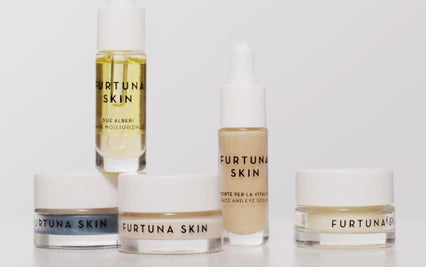
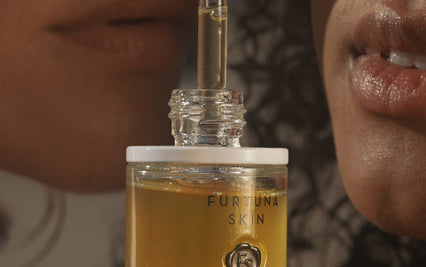
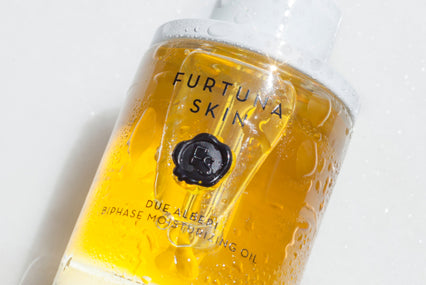
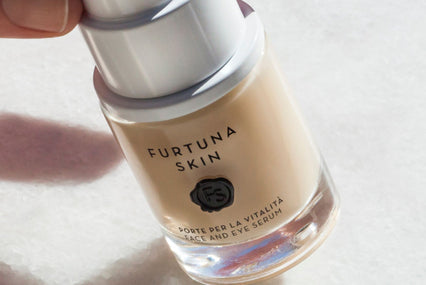
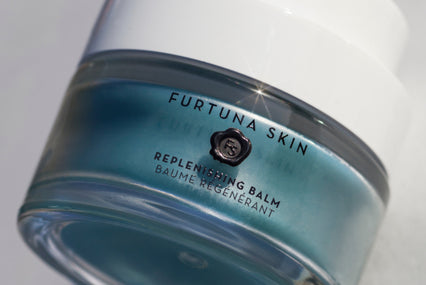
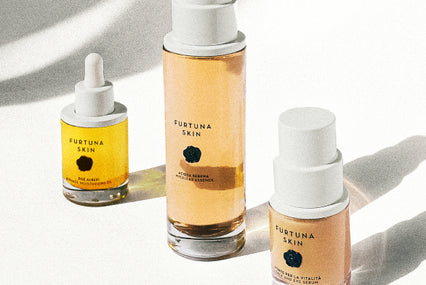

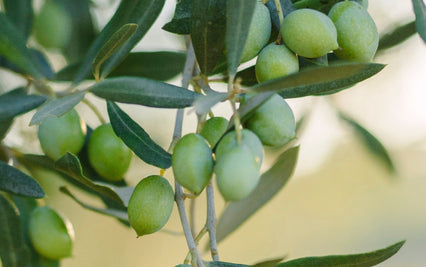




Comment